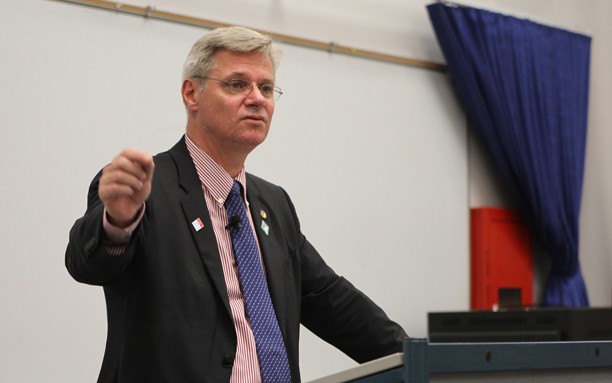Danish ambassador Peter Taksøe-Jensen spoke on his country’s green agenda, renewable energy and U.S. progress with cleaner energy at the James E. Rogers College of Law on Friday afternoon.
The speech, part of the “Danes in the Desert” series, covered topics from renewable energy to the European debt crisis and President Barack Obama.
Although about 80 percent of Denmark’s energy still comes from oil, coal and gas, the country intends to be using renewable energy for 33 percent of its energy needs by 2020, and to be 100 percent fossil fuel free by 2050, according to the country’s official website.
“This problem is so big and the solution is so big it’s difficult for normal people to cope with,” Taksøe-Jensen said.
To achieve this, the country has invested in renewable sources such as bio-energy and wind power.
“Denmark is the first country to present such a specific and ambitious strategy for achieving independence from fossil fuels,” said Lykke Friis, who was the Danish minister for climate and energy when the plan was released in 2011.
Taksøe-Jensen said that as a small country, with a little more than 5.5 million people, the way to impact the world is through international conversation.
“It’s difficult to be a winning country in a losing region,” Taksøe-Jensen said, referring to Europe’s economic troubles.
Due to the debt crisis and how people currently live, switching to cleaner energy sources and saving the economy is going to a be drastic change, Taksøe-Jensen said.
“When I come to D.C., this is the burden I have on my shoulders: To ensure that the U.S. does not step too much on the little mouse, Denmark,” Taksøe-Jensen said.
Taksøe-Jensen said he was pleased to hear Obama speak about importance of cleaner energy and the significance of climate change in his inaugural address.
“It’s similar to you guys here in Tucson,” said John Larsen, the honorary consul of Denmark for Arizona and New Mexico. “You can’t change the people up in Phoenix, but if you can change something by doing or showing, then suddenly it becomes a different point.”
Larsen added that Pima County and Denmark’s efforts to conserve energy are comparable, whether through solar power or wind power.
“I just think if you have the ambassador of a little nation that is so innovative and has so many parallels really to Tucson and Pima County, it’s important for the UofA to take advantage of [that],” said Mia Hansen, project coordinator for Danes in the Desert.
The Danes in the Desert series, highlighted by the ambassador’s presence and an international soccer exhibition game between Denmark and Canada, runs through Feb 6.
“I think it’s a great, great avenue for spreading understand[ing] on what Denmark’s all about and what we stand for,” Larsen said.









